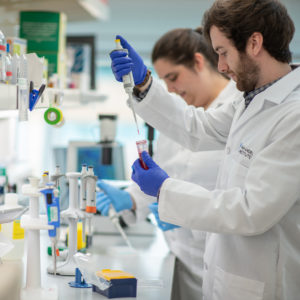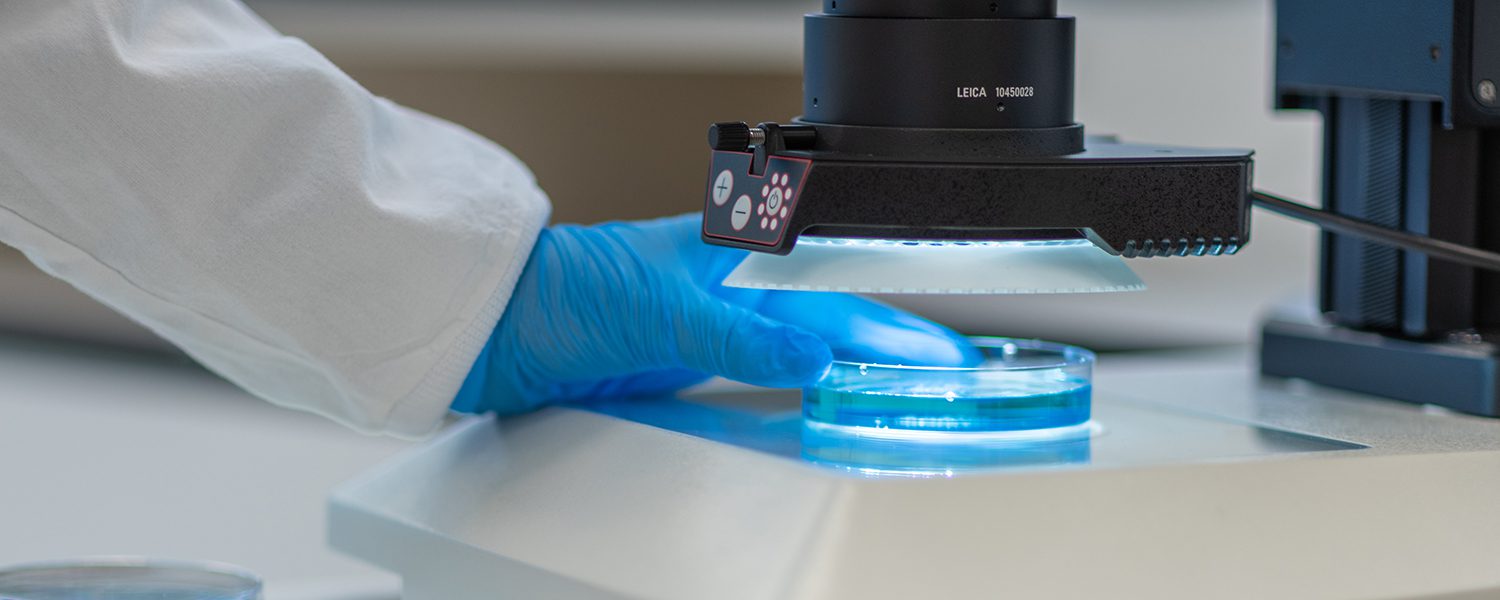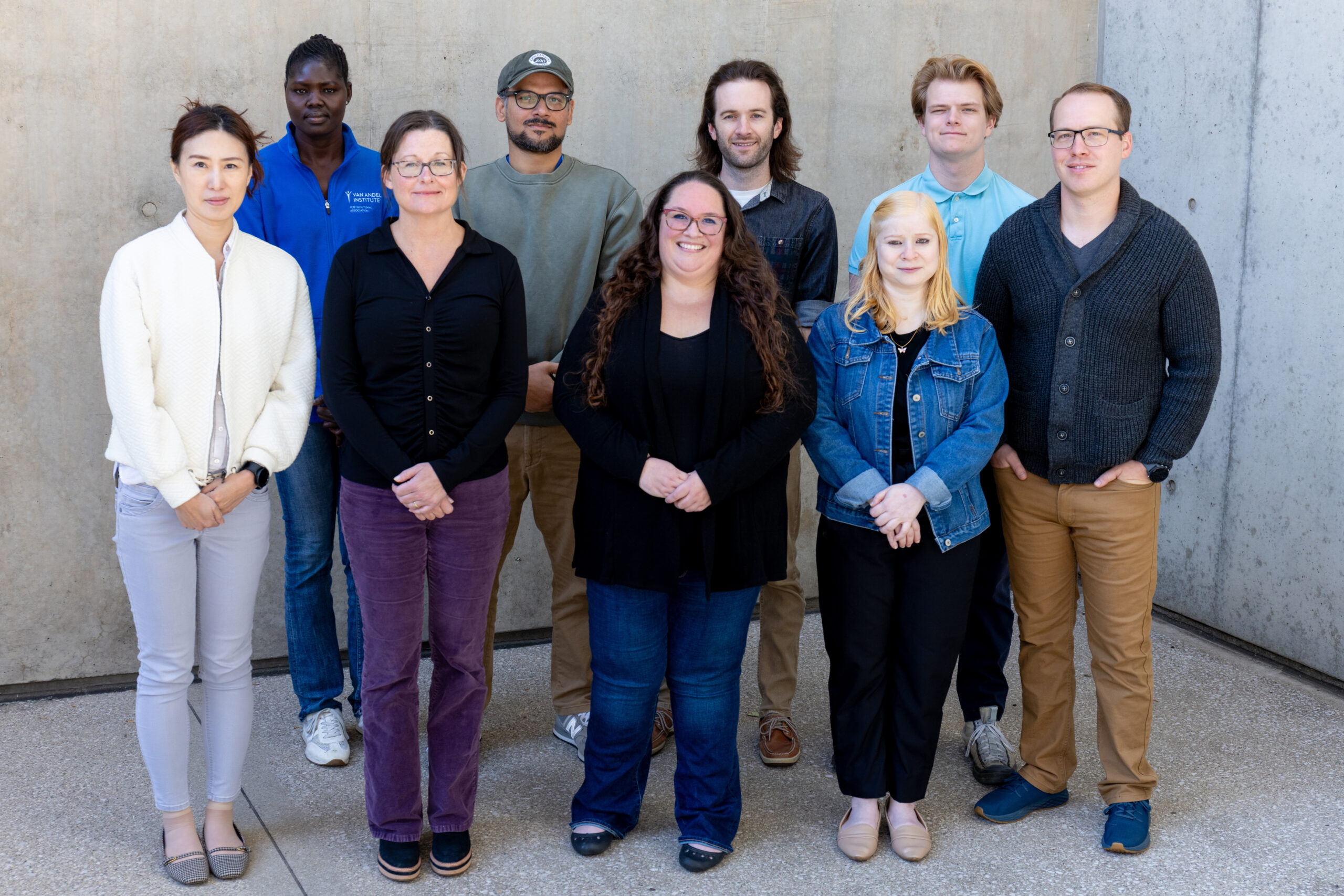Lena Brundin
Laboratory
 Behavioral Medicine
Behavioral Medicine
The laboratory of Dr. Lena Brundin investigates how inflammation in the periphery and central nervous systems contributes to neurological disorders, such as Parkinson’s disease, and psychiatric symptoms, such as depression, anxiety and suicidal thoughts/behavior.
Inflammation can be caused by many different factors and generates a cascade of cytokines, chemokines and metabolites that have intricate effects on neurons and other brain cells. The details of how inflammation impacts the central nervous system are just beginning to be understood. In our studies, we seek to identify inflammatory changes and link them to neurological symptoms. Through this approach, we aim to find novel therapeutic strategies that target inflammation and improve treatment outcomes.
Recent News & Featured Publications
Learn More
Finding a home in biomedical research

The link between inflammation and depression

Western Michigan University Homer Stryker M.D. School of Medicine, Van Andel Institute and Western Michigan University Join the National Network of Depression Centers
Labrie V, Brundin L. Harbingers of mental illness—infections associated with an increased risk for neuropsychiatric illness in children. JAMA Psych.
Bay-Richter C et al. A role for inflammatory metabolites as modulators of the glutamate N-methyl-D-aspartate receptor in depression and suicidality. Brain Behav Immun.
Brundin L et al. The role of inflammation in suicidal behaviour. Acta Psychiatr Scand.
Our Impact
We’re raising thousands to save millions.
We’re turning hope into action for the millions of people around the world affected by diseases like cancer and Parkinson’s. Find out how you can help us make a difference.
- 122 peer-reviewed papers published in 2024, 63 of which were in high-impact journals
- 15 VAI-SU2C Epigenetics Dream Team clinical trials launched to date
- 10 clinical trials co-funded by VAI & Cure Parkinson's (out of 41 total International Linked Clinical Trials Program trials)
Lena Brundin, M.D., Ph.D.
Professor, Department of Neurodegenerative Science
Areas of Expertise
Depression, suicide, inflammation, glutamate, perinatal depression, clinical studies, translational research
Biography
Dr. Lena Brundin earned her Ph.D. in neurobiology and her M.D. from Lund University, Sweden, where she specialized in clinical psychiatry and later attained the rank of associate professor. In 2012, she joined Van Andel Institute and Michigan State University College of Human Medicine in Grand Rapids, Mich. She is currently a professor in the Institute’s Department for Neurodegenerative Science.
Dr. Brundin’s research spans basic and clinical research, and focuses on the role of inflammatory mediators in psychiatric and neurological conditions, particularly the effects of the kynurenine metabolic pathway in depression and Parkinson’s disease. Her studies were among the first to indicate a role for inflammatory cytokines in suicidality, a finding that one day may help develop biomarkers for depression and suicide risk. She is currently the principal investigator on an R01-funded clinical trial that investigates the role of the kynurenine pathway in depressive patients with suicide risk. She also analyzes the potential of these metabolites as biomarkers and modulators of disease progression in Parkinson’s disease, funded by the Michael J. Fox Foundation. Further, she pursues studies aimed at identifying triggers of these disorders, such as bacterial, parasitic and viral infections.
Selected Publications
Forton C, DeVries J, Lou M, Brundin S, Cave T, Anis E, Madaj ZB, Isaguirre C, Johnson A, Sheldon RD, Smart L, Bohnert KM, Kassien J, Holzgen O, Youssef NA, Khan T, Brundin L. 2025. Gut microbiome‑derived tryptophan metabolites predict relapse in alcohol use disorder. Brain Behav Immun.
Anis E, Smart L, Capan C, Forton C, Escobar Galvis ML, Sha Q, Achtyes E, Brundin L. 2024. Herpes simplex reactivation triggers symptoms exacerbation in patients with major depressive disorder. J Affect Disord 18.
Sha Q, Escobar Galvis ML, Madaj ZB, Keaton SA, Smart L, Edgerly YM, Anis E, Leach R, Osborne LM, Achtyes E, Brundin L. 2024. Dysregulated placental expression of kynurenine pathway enzymes is associated with inflammation and depression in pregnancy. Brain Behav Immun 119:146–153.
Sha Q, Fu Z, Escobar Galvis ML, Madaj Z, Underwood MD, Steiner JA, Dwork A, Simpson N, Galfalvy H, Rozoklija G, Achtyes EA, Mann JJ, Brundin L. 2023. Integrative transcriptome- and DNA methylation analysis of brain tissue from the temporal pole in suicide decedents and their controls. Mol Psych.
Peelaerts W, Mercado G, George S, Villumsen M, Kasen A, Aguileta, Linstow C, Sutter AB, Kuhn E, Stetzik L, Sheridan R, Bergkvist L, Meyerdirk L, Lindqvist A, Escobar Galvis ML, Van den Haute C, Hultgren SJ, Baekelandt V, Pospisilik JA, Brudek T, Aznar S, Steiner JA, Henderson MX, Brundin L, Ivanova MI, Hannan TJ, Brundin P. 2023. Urinary tract infections trigger synucleinopathy via the innate immune response. Acta Neuropathol 6.
Anis E, Xie A, Brundin L, Brundin P. 2022. Digesting recent findings: Gut alpha-synuclein, microbiome changes in Parkinson’s disease. Trends Endocrinol Metab 33(12):147–157.
Burmeister AR, Gordevičius J, Paul EN, Houck C, George S, Escobar Galvis ML, Sha Q, Brundin P, Pospisilik JA, Racicot K, Brundin L. 2022. Maternal herpesviridae infection during pregnancy alters midbrain dopaminergic signatures in adult offspring. Neurobiol Dis 169:105720.
Rengasamy M, Brundin L, Griffo A, Panny B, Capan C, Forton C, Price RB. 2022. Cytokine and reward circuitry relationships in treatment-resistant depression. Biol Psychiatry Glob Open Sci 2(1):45–53.
Stetzik L, Mercado G, Smith L, George S, Quansah E, Luda K, Schulz E, Meyerdirk L, Lindquist A, Bergsma A, Jones RG, Brundin L, Henderson MX, Pospisilik JA, Brundin P. 2022. A novel automated morphological analysis of IBA1+ microglia using a deep learning assisted model. Front Cell Neurosci 16:944875.
Xie A, Ensink E, Li P, Gordevičius J, Marshall LL, George S, Pospisilik JA, Aho VTE, Houser MC, Pereira PAB, Rudi K, Paulin L, Tansey MG, Auvinen P, Brundin P, Brundin L, Labrie V, Scheperjans F. 2022. Bacterial butyrate in Parkinson’s disease is linked to epigenetic changes and depressive symptoms. Mov Disord 37(8):1644–1653.
Sha Q, Madaj Z, Keaton S, Escobar Galvis ML, Smart L, Krzyzanowksi S, Fezleabas AT, Leach R, Postolache TT, Achtyes AD, Brundin L. 2022. Cytokines and trytophan metabolites can predict depressive symptoms in pregnancy. Transl Psych 12(35).
Kasen A, Houck C, Burmeister AR, Sha Q, Brundin L, Brundin P. 2022. Upregulation of α-synuclein following immune activation: Possible trigger of Parkinson’s disease. Neurobiol Dis 166:105654.
George S, Tyson T, Rey NL, Sheridan R, Peelaerts W, Becker K, Schulz E, Meyerdirk L, Burmeister AR, von Linstow CU, Steiner JA, Escobar Galvis ML, Ma J, Pospisilik JA, Labrie V, Brundin L, Brundin P. 2021. T cells limit accumulation of aggregate pathology following intrastratial injection of a-synuclein fibrils. J Park Dis. 11(2):585–603.
Bacelis J, Compagno M, George S, Pospisilik A, Brundin P, Torinsson A, Brundin L. 2021. Decreased risk of Parkinson’s disease after rheumatoid arthritis diagnosis: a nested case-control study with matched cases and controls. J Parkinson’s Dis.
Li P, Killinger BA, Ensink E, Beddows I, Yilmaz A, Lubben N, Lamp J, Schilthuis M, Vega IE, Woltjer R, Pospisilik JA, Brundin P, Brundin L, Graham SF, Labrie V. 2021. Gut microbiota dysbiosis is associated with elevated bile acids in Parkinson’s disease. Metabolites 11(1):29.
Sha Q, Achtyes E, Nagalla M, Keaton A, Smart L, Leach R, Brundin L. 2021. Associations between estrogen and progesterone, the kynurenine pathway, and inflammation in the post-partum. J Affect Dis 281:9–12.
George S, Rey NL, Tyson T, Esquibel C, Meyerdirk L, Schulz E, Pierce S, Burmeister AR, Madaj Z, Steiner JA, Escobar Galvis ML, Brundin L, Brundin P. 2019. Microglia affect alpha-synuclein cell-to-cell transfer in a mouse model of Parkinson’s disease. Mol Neurodegener 14:34.
Achtyes E, Keaton SA, Smart L, Burmeister AR, Heilman PL, Krzyzanowski S, Nagalla M, Guillemin GJ, Escobar Galvis ML, Lim CK, Muzik M, Postolache TT, Leach R, Brundin L. 2019. Inflammation and kynurenine pathway dysregulation in post-partum women with severe and suicidal depression. Brain Behav Immun.
Keaton SA, Madaj ZB, Heilman P, Smart L, Grit J, Gibbons R, Postolache TT, Roaten K, Achtyes ED, Brundin L. 2019. An inflammatory profile linked to increased suicide risk. J Affect Disord 247:57 65.
Ohlsson L, Gustafsson A, Lavant E, Suneson K, Brundin L, Westin A, Ljunggren L, Lindqvist D. 2018. Leaky gut biomarkers in depression and suicidal behavior. Acta Psychiatrica Scandinavica.
Labrie V, Brundin L. 2018. Harbingers of mental illness—infections associated with an increased risk for neuropsychiatric illness in children. JAMA Psych.
Johnson ME, Stecher B, Labrie V, Brundin L, Brundin P. 2018. Triggers, facilitators and aggravators: Redefining Parkinson’s disease pathogenesis. Trends Neurosci.
Killinger BA*, Madaj Z*, Sikora JW, Rey N, Haas AJ, Vepa Y, Lindqvist D, Chen H, Thomas PM, Brundin P, Brundin L, Labrie V. 2018. The veriform appendix impacts the risk of developing Parkinson’s. Sci Transl Med 10(465):eaar5280.
Thirtamara-Rajamani K, Li P, Escobar Galvis ML, Labrie V, Brundin P, Brundin L. 2017. Is the enzyme ACMSD a novel therapeutic target in Parkinson’s disease?. J Parkinson Dis 7(4):577–587.
Brundin L, Sellgren CM, Lim CK, Grit J, Pålsson E, Landén M, Samuelsson M, Lundgren K, Brundin P, Fuchs D, Postolache TT, Traskman-Bendz L, Guillemin GJ, Erhardt S. 2016. An enzyme in the kynurenine pathway that governs vulnerability to suicidal behavior by regulating excitotoxicity and neuroinflammation. Transl Psychiatry 6:e865.
Coetzee SG, Pierce S, Brundin P, Brundin L, Hazelett DJ, Coetzee GA. In press. Enrichment of risk SNPs in regulatory regions implicate diverse tissues in Parkinson’s disease etiology. Sci Rep.
Erhardt S, Lim CK, Linderholm KR, Janelidze S, Lindqvist D, Samuelsson M, Lundberg K, Postolache TT, Träskman-Bendz L, Guillemin GJ, Brundin L. 2013. Connecting inflammation with glutamate agonism in suicidality. Neuropsychopharmacology 38:743–752.
Janelidze S, Ventorp F, Erhardt S, Hansson O, Minthon L, Flax J, Samuelsson M, Träskman-Bendz L, Brundin L. 2013. Altered chemokine levels in the cerebrospinal fluid and plasma of suicide attempters. Psychoneuroendocrinology 38(6):853–862.
Suchankova P, Holm G, Träskman-Bendz L, Brundin L, Ekman A. 2013. The +1444C>T polymorphism in the CRP gene: a study on personality traits and suicidal behaviour. Psychiatr Genet 23(2):70-76.
Bay-Richter C, Hallberg L, Ventorp F, Janelidze S, Brundin L. 2012. Aldosterone synergizes with peripheral inflammation to induce brain IL-1β expression and depressive-like effects. Cytokine 60(3): 749–754.
Lindqvist D, Kaufman E, Brundin L, Hall S, Surova Y, Hansson O. 2012. Non-motor symptoms in patients with Parkinson’s disease—correlations with inflammatory cytokines in serum. PLoS One 7(10): e47387.
Zhang Y, Träskman-Bendz L, Janelidze S, Langenberg P, Saleh A, Constantine N, Okusaga O, Bay-Richter C, Brundin L*, Postolache TT*. 2012. Toxoplasma gondii immunoglobulin G antibodies and nonfatal suicidal self-directed violence. J Clin Psychiatry 73(8): 1069–1076.
*Shared last authorship



Ehraz Anis, Ph.D.
Clinical Study Coordinator/Postdoctoral Fellow, Brundin Laboratory
Exploring the contribution of the vermiform appendix to Parkinson’s disease

Tyce Cave
Laboratory Manager, Department of Neurodegenerative Science

Jamie Durst, B.S.
Senior Administrative Assistant II, Department of Neurodegenerative Science


Qiong (Jade) Sha, Ph.D.
Research Scientist, Department of Neurodegenerative Science



